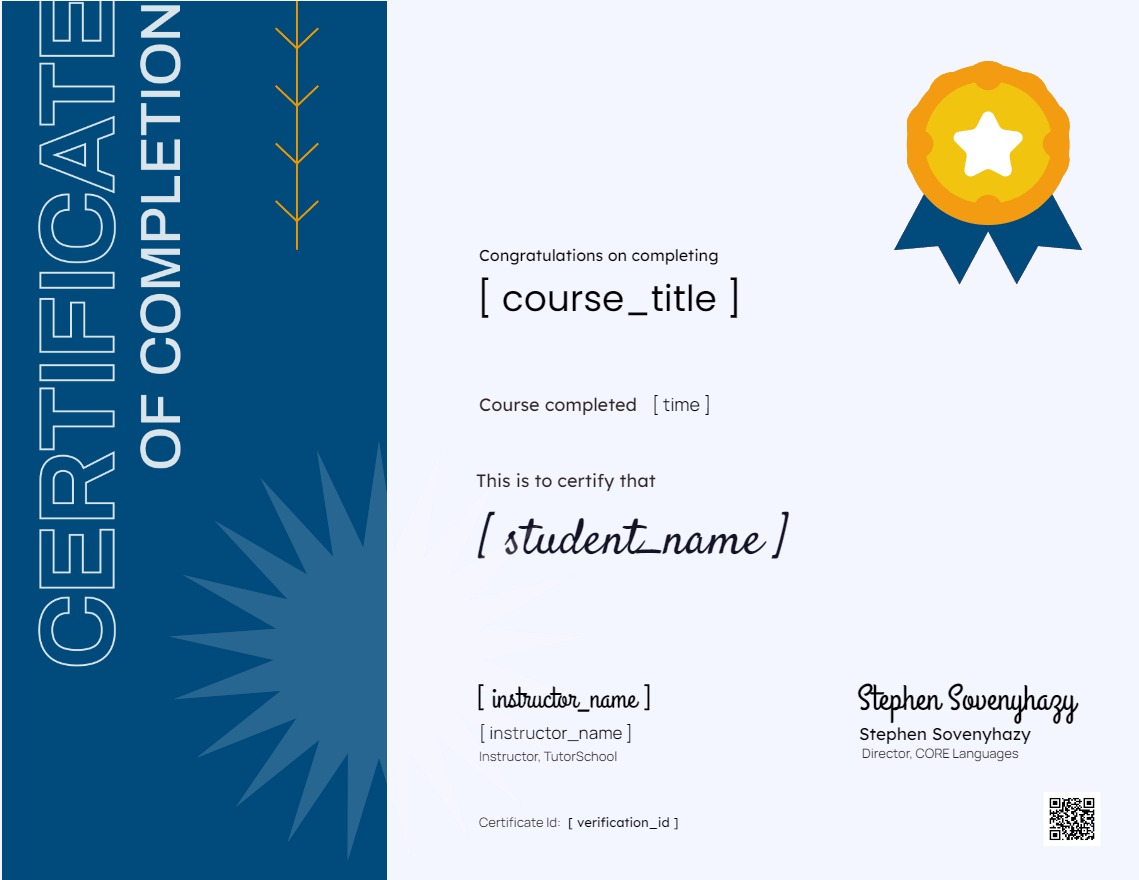Basic German Grammar Topics

About Course
CEFR A1 Level: German A1.1 and A1.2
CORE Languages offers bite size courses lasting about 10 weeks each. We split A1.1 into two courses to offer flexibility for your scheduling and the option to review specific topics without repeating a much longer course.
- Level A1.1 is a course designed for beginners, someone who has had no previous experience with German. It covers basic vocabulary, verbs in the present tense and the German sentence structure. The activities in Level 1 focus on giving basic information about yourself, understanding numbers and how to tell the time. And continues to focus on the present tense, adding separable and irregular verbs. It also looks at the past tenses of haben and sein as well as accusative objects. Conversational topics of this level include shopping for groceries, the daily routine and family.
- Level A1.2 focuses on the German imperative forms and the first introduction to the Perfekt tense as well as modal verbs. Students will learn about tourism in Berlin and understanding as well as actively giving directions. Another topic is finding an apartment and understanding classified ads with their typical abbreviations. The Perfekt tense, adding irregular verbs and the Perfekt tense with sein. We complete the modal verbs and use them in contexts such as health and professional life. This level also deals with reading and writing e-mails in the present and past tense, and making private and business-related phone calls..
After completing these levels, you’ll be able to:
- understand and use familiar everyday expressions and very basic phrases aimed at the satisfaction of needs of a concrete type.
- introduce yourself and others and ask and answer questions about personal details such as where they live, people they know and things they have.
- interact in a simple way provided the other person talks slowly and clearly and is prepared to help.
At CORE Languages, as part of this German curriculum you will learn the following (and more):
A1.1-Greetings and Farewells; Introductions; Saying where one is from; Saying what languages one speaks; Asking and telling how one is doing; Talking about Family; Counting; Talking about where one is from; Talking about others (he, she, we, you, they); Filling out registration forms; Talking about what one has; Naming groceries; Expressing not having and needing things; Talking about what things are not (kein, keine); Expressing prices, units and packaging; Buying items over the counter; Ordering food; Talking about one’s apartment; Comparing things; Talking about furniture; Reading apartment ads; Telling time; Talking about daily routines (split verbs); Expressing dates; Using cardinal and ordinal numbers; Describing what one does at different times of the day; Talking about the weather; Expressing not having things (accusative); Talking about hobbies and free time; Talking about what one can and cannot do; Talking about what one wants; Expressing things in the past; Talking about daily routines in the past; Naming days of the week; Naming months.
A1.2-Talking about jobs and professions; Talking about duration (for & seit); Naming years; Telling one’s life-story; Looking for jobs; Expressing what one has to do (muss); Giving instructions (imperative); Expressing permissions (dürfen); Filling out registration forms; Asking for clarification; Naming body parts; Expressing pain; Expressing belonging (unser, euer, ihr, etc.); Interacting at the doctor; Writing excuses; Making appointments on the phone; Giving directions (review of cardinal and ordinal numbers); Describing locations (Dativ+prepositions of location); Expressing where one is and where on is going (prepositions zu & nach); Asking for the location of places; Expressing sequences in time (vor, nach, bei); Giving precise times in relation to one another (in); Expressing requests politely (könnten; würden); Talking about the function of things; Leaving messages; Complaining about broken equipment; Naming items of clothing; Expressing likes and dislikes; Referring to items without naming them (den, die, das, mir, dir, ihm, ihr, etc.); Talking about taste and preferences; Asking about items and identifying specific items (welche, diese, etc.); Expressing belonging (gehören); Talking about dates and duration; Using accusative pronouns (mich, dich, etc.); Writing and understanding text messages in German; Reading and writing invitations; Talking about holidays in Germany; Writing formal letters.
Course Content
German Gender of Nouns
German Nominative
German Numbers
German Adjectives
German Personal Pronouns
The Future Simple Tense (Futur I)
German Regular Verbs
German Plural Formation
German Accusative Case and Haben
German Word Order
German Definite Articles
German Indefinite Articles
German Negation
German Modal Verbs
German Separable Prefix Verbs
German Coordinating Conjunctions
German Konjunktiv I
German Possessive
German-Present Perfect of Regular Verbs
German Present Perfect-Irregular Verbs
German Present Perfect-Mixed Verbs
German Dative Case
German Two-Way Prepositions
German Dative Case Prepositions
German Conditionals
German Dative Verbs
German Simple Past Tense
German Imperative
German Comparative
German Temporal Prepositions
German Present Perfect-Separable Prefix Verbs
German Irregular Verbs
German Question Words
German Present Perfect-Inseparable Prefix Verbs
Earn a certificate
Add this certificate to your resume to demonstrate your skills & increase your chances of getting noticed.

Student Ratings & Reviews

